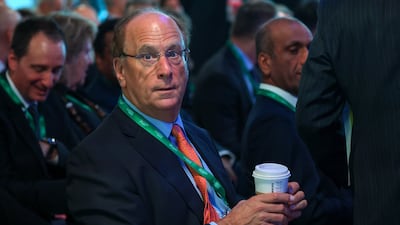The next 1,000 unicorns, or start-ups with valuations of $1 billion, will come from the green industry, said the chief executive of BlackRock, the world's largest asset manager.
“It is my belief that the next 1,000 unicorns — companies that have a market valuation over a billion dollars — won't be a search engine, won't be a media company. They will be businesses developing green hydrogen in green agriculture, green steel and green cement,” Larry Fink told the Middle East Green Initiative forum, which took place in Riyadh on Monday.
Earlier that day, Saudi Arabia announced the establishment of a national infrastructure fund with BlackRock to support up to 200bn Saudi riyals ($53.4bn) of investments in critical sectors. The fund will invest in projects in sectors such as transport, water, energy, health, education, telecoms and digital infrastructure.
The commitment follows an earlier pledge by Saudi Arabia, the world's largest exporter of crude, to reach net-zero emissions by 2060. The kingdom's pledge only applies to domestic emissions and not to those released by the use of crude products exported by Saudi Arabia.
BlackRock is one of the most vocal advocates for factoring in climate as an investment risk. The company joined fellow asset manager Vanguard Group and 43 others in committing to cut net greenhouse gas emissions from their portfolios to zero.
“Climate change not only presents a significant challenge but an enormous opportunity,” Mr Fink said.
“Getting to net-zero carbon emissions by 2050 is going to require a revolution in the production of everything we produce and a revolution in everything we consume, the process of creating fuel, food and construction materials with all the needs that we have as humanity,” he added.
Multilateral banks such as the International Monetary Fund are calling for greater investments to finance the transition to a greener economy.
About $20 trillion in investment is needed over the next two decades for companies and countries to become carbon neutral by the middle of the century, the Washington-based lender said in a report this month.
US climate change envoy John Kerry also urged private capital to help accelerate the transition away from fossil fuels.
“No government in the world has the money to get this done. Not even the wealthiest countries,” Mr Kerry told the conference.
“This will only happen in the work of government joining with the private sector and with the private sector very significantly stepping up and taking the lead, here,” he added.
The former diplomat has previously called on multilateral development institutions such as the World Bank to move away from financing high-polluting fuels such as coal.
“This [energy transition] is the biggest market opportunity the world has ever known. It's the biggest market the world has ever known. It's the biggest transformation that has ever taken place on this planet, since the Industrial Revolution, if we do it,” he said.
Also speaking at the forum, Noel Quinn, group chief executive at HSBC, said the commercial banking industry needed “a fundamental re-engineering” to support corporate activity in the transition to net zero.
“This year alone, we have already helped our customers issue $170bn of green bonds with a broader range of structures and a greater variety of issuers than ever before. But the next phase of development will require more than just capital market activity,” Mr Quinn said.
The sustainable finance industry will experience a rapid growth spurt and is on track to reach “the first trillion-dollar year for green bonds,” he added.
“In the first nine months of 2021, green social and sustainable bonds raised more than $777bn. That's more than 60 per cent higher than the same period last year.”


